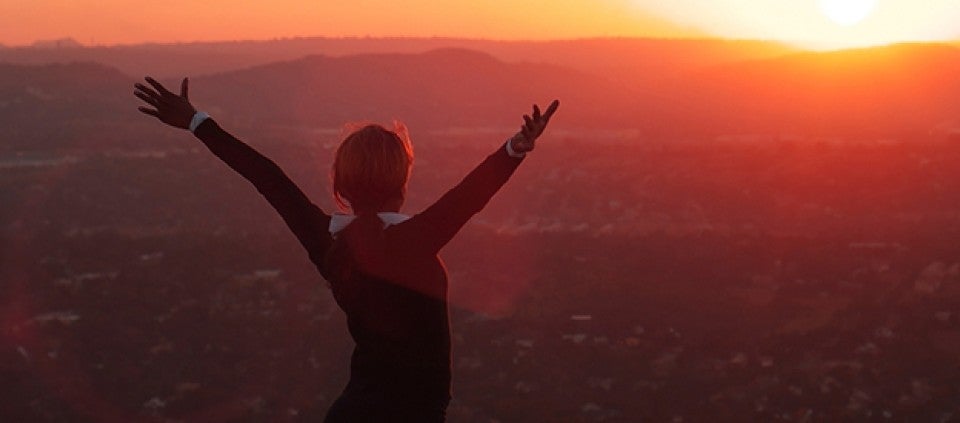When Happy Is Hard

When people hear that I’m a Positive Psychology Coach, they sometimes mistakenly assume that I’m all about positive thinking and denying or sugarcoating reality. While the science behind positive psychology does point to the value of appreciating, cultivating, and savoring the good in our lives, it also acknowledges that life is full of loss, pain, illness, disappointment, and setbacks.
“Not everything happens for the best, but some people are able to make the best of what happens,” says positive psychologist Tal Ben-Shahar. The practice he suggests, known as benefit finding (we know it as finding the silver lining or making lemonade from lemons) helps us survive hardship and build resilience.
Even when life is hard, we can seek to learn, grow, and be fully present to whatever is happening. And when happiness feels miles away and joy seems like a luxury, we can reach for other positive emotions to keep us buoyed and build resilience.
I learned this firsthand during a year in which I ended my marriage, lost two dear uncles, and nearly lost my father.
As I moved through these painful changes, traumas, and endings, many of my days were saturated with grief. Despite this, I still had to show up for my work as a coach and teacher of happiness and fulfillment. The challenge of having to walk my talk was more daunting than ever.
In response, I increased my habit of consciously registering the things that expanded my heart, lifted my spirits, and excited my mind. While this practice didn’t always take me from “zero to happy,” it allowed me to be there for my students and clients, and for my aching self. Training my mind to see the good, while also letting myself feel and process my grief, kept me from spiraling downward.
I took walks to boost my mood and care for my body, taking in the blue of the sky, the multihued clouds and the many colors of the leaves. Appreciating beauty is one of my strengths, and I use it every day. Time in nature, and my spiritual practices, helped me focus on the positive emotions of awe and reverence for something greater than myself.
I reached out to friends who could listen compassionately and help me to hold what I couldn’t hold by myself. Such moments allowed me to feel seen and heard, honoring my deeply ingrained values of authenticity and connection. Knowing how good that felt, I sent notes and made calls to others who were suffering, which allowed me to feel helpful and stop ruminating.
I hung out with friends who inspired me to laugh and talk about books, movies, ideas, and the news of the day. These gatherings fed my hunger for knowledge, stimulated my curiosity, and provided humor. Inspiring quotes and content on the Internet also helped, as did funny articles and, yes, cute baby and animal videos.
Gratitude, my go-to positive emotion, was something I reached for continuously when the sadness threatened to overtake me. Consciously appreciating the people I was losing and the gifts they’d given me, and feeling grateful for my family, home, health, and material comforts, served to soften my heavy heart. I also practiced and took in kindness whenever possible.
My work, challenging as it was some days, met my need for meaningful engagement and allowed me to use my skills, passions, and creativity. It also helped channel my energies into growing my business while other things around me were fading or dying.
As the Buddha stated in the first Noble Truth, life involves pain and suffering. How we meet and interpret our difficulties determines how much we will suffer. Doing what we can to cultivate positive emotions and remain optimistic in tough times can help us to get through them, and even triumph.
My favorite quote on this subject comes from American historian Howard Zinn, who said that being optimistic is not foolish, but grounded in the reality—that, while history is full of tragedy and cruelty, it’s also full of compassion, courage, and kindness.
“If we see only the worst, it destroys our capacity to do something,” he wrote. “If we remember those times and places—and there are so many—where people have behaved magnificently, this gives us the energy to act, and at least the possibility of sending this spinning top of a world in a different direction. And if we do act, in however small a way, we don’t have to wait for some grand utopian future. The future is an infinite succession of presents, and to live now as we think human beings should live, in defiance of all that is bad around us, is itself a marvelous victory.”
I’m proud to call myself an optimist, even when happy feels hard.
Kim Childs is a Boston-based life and career coach and writer who specializes in positive psychology. She is also a Kripalu Yoga teacher and facilitator of workshops based on The Artist's Way: A Spiritual Path to Higher Creativity, by Julia Cameron.
© Kripalu Center for Yoga & Health. All rights reserved. To request permission to reprint, please e-mail editor@kripalu.org.
Kim Childs is a Boston-area life and career coach specializing in Positive Psychology, creativity, and spiritual living. She writes for Kripalu.
Full Bio and Programs